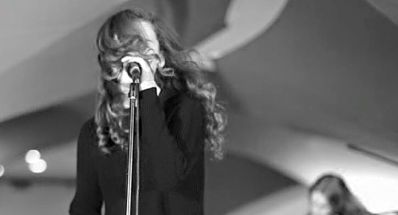
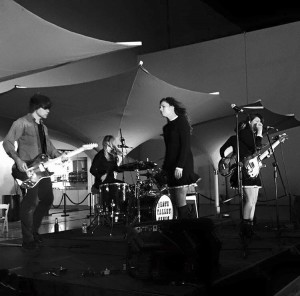
High noon. Under the stark, blue February sky I encounter Bonnie Bloomgarden standing at the entrance of the Red Lion Tavern in Echo Park. The singer/guitarist of the doom rock outfit Death Valley Girls greets me in green sparkly eye makeup with a big smile and gifts in the form of a limited edition 7” and a live singles cassette wrapped in caution tape. I rejoice and accept like it’s the Holy Communion. After slipping into the dark of the ancient Germanic pub, we head to the upstairs bar.
Death Valley Girls have popped up on the indie map like a baffling string of UFO sightings, ever since their Street Venom debut. Some may remember Bloomgarden’s exploits in the NY band The Witnesses, or maybe her cameo in King Tuff’s third album Black Moon Spell. Though perhaps nothing was as enthralling as DVG’s performance last October at the Natural History Museum’s mummy exhibit, which served more as a necromantic rock séance to communicate in peace with the Egyptian dead.
The new Death Valley Girls LP Glow in the Dark is due June 10th via Burger Records, just in time for Burger Boogaloo. It’s unlike anything we’ve heard from them before. Though the dystopian occult glam proto-metal signature still rings true, Bloomgarden has moved DVG from the lonely, claustrophobic confines of “Sanitarium Blues” out into the interconnected cosmos. You’ll find yourself headbanging to the catchy title track “Glow in the Dark”—which effectively punches a hole through dark matter—and with more meandering, hauntingly luminous songs like “Pink Radiation,” the album serves as mythic enchantment crafted into colored vinyl beacon for those riding the same spacetime groove. “At night when we’re together/ It sets off a spark/ That’s why we glow in the dark…”
Our table is flanked by the fat day-drinking good ‘ol boys who leer over at us between barks and laughs and swigs of beer. Between her black sweater that reads “I was naughty this year” and my Gun Club band shirt with each member rendered decapitated, we definitely stand out from the usual suspects (why do dive bar regs always looks like old sailors?)
Bloomgarden nevertheless sits content, looking around with a mischievous grin. “I thought it might’ve been weird coming here at first, but I forgot how much I like this place,” she says giggling. Though I’m told Death Valley Girl’s singer, Jessie Jones, is more considered the band’s “Squeaky Fromme,” I definitely see a lot of Fromme in Bloomgarden. What, with her radiance of carefree bliss, ruminating mind and feminine mystique that presumably draws its power from the lunar phase.
In case you’re hazy, Lynette “Squeaky” Fromme was a core member of the notorious Manson Family gang—a dark piece of L.A. history from which the band draws its inspiration. While Fromme wasn’t involved in the 1969 Tate-LaBianca murders that shocked the world and kept suburban doors forever deadlocked, she holds the distinction of being the first woman to ever attempt an assassination on an American president (the honorable Gerald Ford), for which she was given a life sentence. Fromme received parole in 2009. Whereabouts unknown. The .45 pistol she used is currently on display at the Gerald Ford Presidential Museum.
Rest assured, Bloomgarden herself has no criminal prospects. Her interest lies more in amassing lost souls and cultivating individuality. The metamodern White Witch of L.A., she and friends are currently constructing the ‘Cosmic Underground’—a disembodied collective whose subversive crux is surpassed only by its creative unity and output. This is the stuff of true transformation, and for a post-apocalyptic world—in which we’re constantly sentencing ourselves to our own solitary confinements—it’s exactly what we need.
It’s no secret Bonnie Bloomgarden has a penchant for the paranormal, so I tried to see just how far down that road we could go. Over a pitcher of cheap imported pilsner, we let loose the candid rambling on lucid dreaming, channeling as songwriting, what we learned from Helter Skelter, and why the Cosmic Underground is definitely the cult to join.
“Well, rock n roll is obviously the most important thing in the world, but also not everyone is in the band. There are so many others things that are important besides rock n roll. Like UFOs or magic or horror movies or art or books. It’s more of a way for everyone to be included, a commune/community kind of thing. A lot of what’s behind the Death Valley Girls moniker is more the idea of the Barker Ranch. The idea that you can let go and create…”- Bonnie Bloomgarden
Brent Smith: What was the genesis for Death Valley Girls?
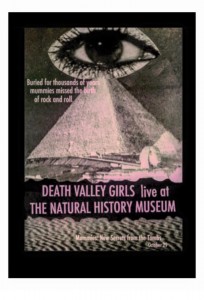 Bonnie Bloomgarden: It’s hard to say. Me and my best bud at the time were jamming and we needed a drummer and a guitar player, and at one point I got fed up—I don’t like it here [in L.A.] much—and I said “if I don’t find a guitar player and drummer in a month, that’s it, I’m outta here.” And then the next week we met Larry and Patty [Schemel] and started playing with them, and it just clicked, that was it. We practiced every Friday for like a year. I don’t know how it came together, but we all just needed to rock n roll.
Bonnie Bloomgarden: It’s hard to say. Me and my best bud at the time were jamming and we needed a drummer and a guitar player, and at one point I got fed up—I don’t like it here [in L.A.] much—and I said “if I don’t find a guitar player and drummer in a month, that’s it, I’m outta here.” And then the next week we met Larry and Patty [Schemel] and started playing with them, and it just clicked, that was it. We practiced every Friday for like a year. I don’t know how it came together, but we all just needed to rock n roll.
Brent Smith: And you’ve been a band for a few years now?
Bonnie Bloomgarden: Two years, I think. I’m realizing I have no concept of time. I feel like Los Angeles is the island from Lost or something. So many supernatural things have happened since we’ve come here. I can’t really tell if I came to L.A. or if I’m still dreaming in New York.
BS: When did you return to L.A.?
BB: I don’t really remember. Anywhere from 2008-2012? I know I was here for 2012, that was exciting times. I remember the turmoil.
BS: Like what?
BB: I have a lot of Apocalyptic dreams, like all of a sudden people start floating away and that’s what the Apocalypse is, and I’m aware of it. Sometimes I’ll be in a dream and look up at the clouds, and it’s like someone just throws a bag around them and pulls the world away. Just weird things like that. But 2012 was really epic. Trying my best to write those dreams down every day, I eventually thought it really would be the end of time (laughs).
BS: I think “Apocalypse” is Greek for “revelation.” Power’s definitely up for grabs these days. I think I shroomed around the solstice. I at least wanted to commune with my environment. Like relaxing when you’re in a car wreck, the ones who do always seem to survive. Do you still dream?
BB: I have very intense dreams. I try to provoke that. Some of the things to do if you want to lucid dream is to remind yourself during the day that “I’m awake now,” because the more you’re conscious of the fact that you’re awake, the more conscious you’ll be when you’re asleep and dreaming.
BS: Have you pulled any songs or lyrics from your dreams?
BB: Totally, that’s my new thing. My dreams are very long. In the last six months I realized two things that bothered me after waking up. 1) When I couldn’t go back into the dream, and 2) how I had written a song in the dream, but couldn’t remember it. So I started to focus on that, being aware in the dream to make some associations to the song. Like I’ll put lyrics from a Beach Boys or Beatles song to it, so that it would remind me how it went when I woke up.
BS: Because even when you’re awake it’s hard to remember a song if you don’t record it.
BB: Exactly, some random phrase I wrote down like 15 years ago will immediately make me think of some song I wrote, so I’ve been trying to do this in my dreams.
BS: Are you most of the songs written like that?
BB: Yeah, I hate writing words, it’s not the fun part. Playing is fun and singing is fun, but sitting there and trying to make stuff rhyme seems so silly to me. A lot of our songs in the beginning are those original, random words that I attached just to remember them. Larry would come up with a riff and I’d say “electric high” or something, really silly words. But when we tried to put other words into it, it just didn’t sound right, so we grow to love it. I think songs are up in the air, and you kind of pull them down and they just come to who they come to. They already exist. That’s why they always seem so familiar.
“I was named after Faye Dunaway’s character in Bonnie & Clyde, and so my whole life was this idea of “true romance” and extreme fucking LOVE and going out in a blaze of bullets” –Bonnie Bloomgarden
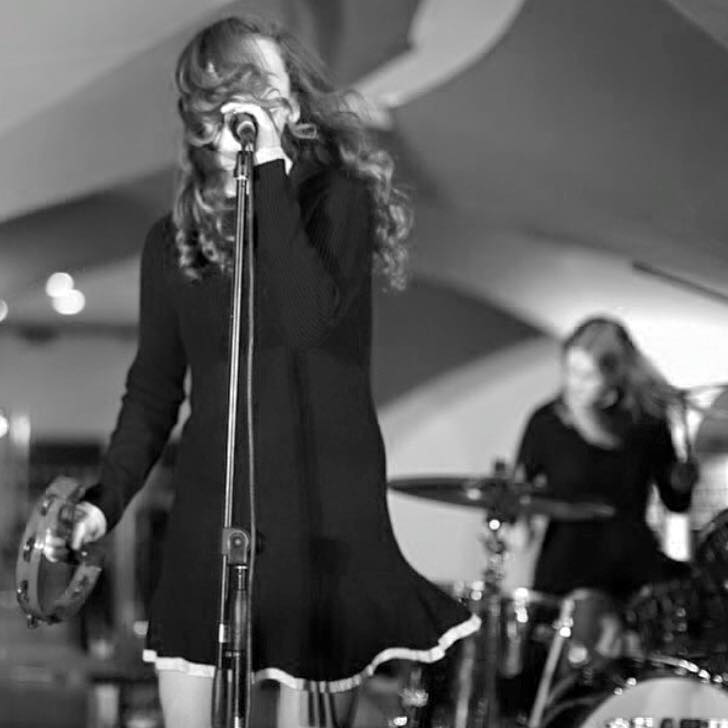
BS: You read Henry Miller?
BB: I know him, but…
BS: He expressed the exact same sentiment actually. Something to the effect that artists are those who have an antennae and can hook up to the currents in the cosmos—to bring them forth and give them a voice. The notion that ‘originality’ is null and void. It’s all about drawing from what’s around you. Bowie and Jello Biafra certainly applied the cut-up technique to their songs.
BB: That’s the thing, becoming familiar with the rhythm of language in different ways. All my poetry, which is really just short stories that I pretend are poems, and the rhythm in it is—I mean, it has its own voice, whatever, but it’s something I just let come to me, y’know? It’s not “me,” it’s just being in touch with how one writes and following the pen. I don’t really edit either. Which brings me to something I really wanted to ask you about! There’s a case that kept coming up when I got all these supernatural books while on tour. Have you heard of Patience Worth?
BS: Can’t say I have.
BB: So around 1912 in Missouri, this woman named Pearl Curran was over at a friend’s house doing a Ouija Board session, which was really popular at the time, and through it she met this woman named Patience Worth, who apparently was from the 17th Century. After keeping in contact, Pearl cranked out like six books by channeling Patience Worth. It was all these old styles of prose and poetry. They did these tests on her, she was even reviewed by the New York Times and stuff, but it eventually ruined her life, she didn’t make any money from the books. But it was nuts, Patience Worth would be writing through Pearl while Pearl was also having a conversation on the phone. People witnessed it, it was very public. These books were literary hits at the time. She even had an understanding of slang and parlance that was ancient, like we’re talking from Biblical times. This coming from a woman with little education.
BS: That kind of stuff really gets me. Cases like that make it impossible for me to just live in a completely rational world. That was also a time when there was a revival in spiritualism, which collided with the age of science and Einstein. I don’t think those two things are so different. I think there’s a reconciliation to be had there. It’s been, what, a century? I think another revival is among us.
BB: You got that right! I don’t really read Patience Worth’s stuff because I’m not very into Victorian writing. I just read science fiction or true crime or like rock bios. I got this new job, so I only read at work. I can’t at home, there are so many distractions.
BS: I work at home. It’s great but not easy. Didn’t take long to figure out how much discipline it actually requires. I wish I could write like Patience Worth, maybe I should get on the Ouija.
BB: I have no discipline. I can seriously only remember that word because you just said it.
BS: But you show up, right? You practice, you write, you put stuff out, you do shows.
BB: But that’s not me…
BS: So who is “you,” really? Does “you” even exist? Maybe not in the way you think “you” does? If you want to get all Zen about it.
BB: I do (laughs). It’s more like a streak of lightning. I’ll be the laziest person and then something will hit me and I’ll be like, “shit, okay, I gotta do this.” But I also don’t sleep. My body doesn’t naturally go to sleep. I have to take something.
“…I lived on this farm with my old band, and that’s where we recorded, so that’s where the idea comes from. We loved the idea of everyone creating and communing and farming, all of these things. But you don’t need to steal, you just need to write music and sell it to commercials (laughs). I don’t want to kill anybody.”- Bonnie Bloomgarden
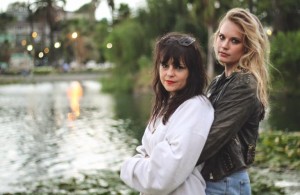
BS: You don’t get tired? I’m jealous.
BB: Really? Sleep is the most beautiful thing in the whole wide world. That’s where your dreams are.
BS: Very true.
BB: I’m addicted to it.
BS: So your dreams are real, but time eludes you…
BB: It’s not only time, it’s faces too. Everyone seems familiar to me and I can’t tell if someone’s from TV or if they work at the store down the street, so I feel like people are always fucking with me. That’s why in our collective we’re super obsessed with how you can communicate with or recognize people non-visually. That’s one of the most important things to me right now.
BS: Your collective? The band?
BB: The band is part of the collective that we’re sort of slowly bringing out—The Cosmic Underground.
BS: What are its tenets?
BB: Well, rock n roll is obviously the most important thing in the world, but also not everyone is in the band. There are so many others things that are important besides rock n roll. Like UFOs or magic or horror movies or art or books. It’s more of a way for everyone to be included, a commune/community kind of thing. A lot of what’s behind the Death Valley Girls moniker is more the idea of the Barker Ranch. The idea that you can let go and create…
BS: New York had Warhol’s Factory. L.A. had the Manson Family?
BB: Not in the Manson way. A little bit. But just the idea of having a place where everybody makes stuff and it’s all together and you can help everyone.
BS: L.A.’s the perfect city for it too. It’s always been culty.
BB: Dropout City.
BS: For the first time in their sheltered suburban lives, those Manson Family kids got a taste of pure freedom, for good or ill. They were really more of an outlaw gang—hence Spahn Ranch being an old western movie set. They were mainly dealing drugs and ripping off cars, doing whatever they had to.
BB: Which is also where we differ.
BS: While we’re on the topic, I actually wanted to show you something, and geek out a bit.
BB: Uh-oh.
BS: There aren’t many people I can talk to about this.
BB: See! That’s what the Cosmic Underground, that’s what we’re trying to do, find a safe space.
I pull out a large envelope containing some old mugshots I’d recently obtained. Bloomgarden’s eyes light up when she realizes one of them is of Lynette ‘Squeaky’ Fromme herself. She excitedly grabs the old photos, doing her best to mind her fingerprints.
BB: Oh my goodness! No way!
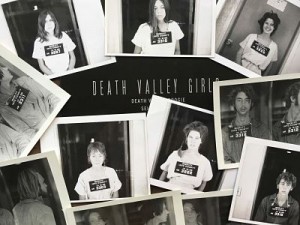
The mugshots are of Manson Family members from the October 1969 Barker Ranch raid, in which Inyo County officers were serving a warrant for Grand Theft Auto charges. The mugshots include members Bruce Davis and Ruth Ann Moorehouse (who all gave phony names), and other nameless young American faces of a tuned-in, dropped-out generation.
BB: These are so cool! That’s crazy! Where did you get these?
BS: Lips are sealed, promised the source. The usual.
BB: They all look so much younger than you’d imagine. I knew they were young, but this girl looks like she’s 16 years old.
BS: She probably was.
BB: Whoever it was just gave these to you?
BS: They didn’t want to hold on to them anymore. You could probably understand why. They’re virtually worthless anyway. I guess somebody had already nabbed Charlie’s mugshot, otherwise I’d have his too.
BB: Wow. These really take you back there. I lived on this farm with my old band, and that’s where we recorded, so that’s where the idea comes from. We loved the idea of everyone creating and communing and farming, all of these things. But you don’t need to steal, you just need to write music and sell it to commercials (laughs). I don’t want to kill anybody.
BS: Researching the Family in depth for the last few years, the problem is sorting out what’s hearsay and what’s substantial. The media was a big part of that problem. What seems clear is the Family’s view about being at “WAR” was geared more toward society systematically fucking up the earth.
BB: That’s certainly as true today as it was then, but it was also still the wild west in a lot of ways. Like really, you pretty much could get away with anything. Nowadays, it’s ridiculous, we’re all paranoid about the government putting tracking devices on us, but we literally buy the tracking devices [she picks up her phone] and we put them on ourselves. They were out there in the desert and a lot of them believed in peace and love and they were out there to incite change, and I guess violence was the way to do it. It made sense then, it almost was the only way to make a wave. Now, you can’t walk down the street without it getting captured on camera or posted on Instagram.
BS: Unless you unplug entirely. How funny would it be for Charlie Manson to have to implement a “No Phones” policy. He’s still alive, too, which is insane. He’s outlived everyone.
BB: I know. We’ve been writing letters but he hasn’t responded or anything.
BS: It’s a crazy long waitlist to see him too. I’ve actually been trying to track down Squeaky. She moved to New York state after she was released but there’s not much info. She’s not easy to find. But she might’ve been on Twitter for a hot minute. The Manson Family on Twitter—you can’t make that up.
BB: It’s a tale that has so much controversy and is so epic and everyone knows about it. There’s just a way to do it without murder. The fact that it’s utopia gone wrong is what makes it so interesting.
BS: But can you ever really have utopia?
BB: Yes, you can.
BS: Doesn’t violence have its place, in a way? I’m not pro-war or anything, but are we able to totally stamp out violence among people?
BB: I think so. Especially with phones and the internet and the ability to get your emotions out in several outlets at once. I’d be willing to bet violence will be a thing of the past.
BS: So what’s new in the Cosmic Underground?
BB: What we’re working on now is something called Optimysticism.
BS: That’s rad. Tell me more.
BB: So instead of regular psychic readings or tarot or astrological stuff, it’s using several different things to see what someone is saying when they talk to you, and seeing where they’re coming from, being non-reactive, then looking at and using optimism and mysticism to help build a connection.
BS: We’re very reactive, generally speaking—defensive.
BB: Which is fair, but you can look at why people are doing things from a psychic understanding, from a loving place. I’m working on being an optimystic.
BS: Sounds good to me. I could really use some of that. I’m such a sardonic fuck, it’s probably already too late for me. But at the same time, I love the horror genre, as do you, which is such a great vehicle to explore what’s horrific and, hopefully, to get past it.
BB: Right, well you have to have the thing you’re into in order to create the art that you create. And if it’s being cynical and thinking of things in a horrific way, and that’s what gets you to create, then who’s to say you can’t be that person entirely in a protected way? That’s what this is. I see so many people who cannot exist on their own, and we just want to make a way to help them be their own artist, while also knowing how to take care of themselves, feed themselves, clean. Y’know? It’s like, we will help you do these things and you just be you. Hopefully at some point we will have a compound or something where people can be that artist who can’t do shit but create, and at the same time is also dialed in to some kind of like ritual.
BS: As opposed to routine.
BB: On the farm, we’d be woken up with a chainsaw, and they’d be like, “Get up! It’s sunny out!”
BS: The same farm you lived on with your band? That was in New York?
BB: Upstate New York. Outside of Woodstock. It was called the Rotten House.
BS: Who ran it?
BB: They were trying to make it a cult. Basically this artist owned it, and this Toby guy ran it. He made sculptures. I didn’t know this, but artists who make giant sculptures don’t actually make them. They hire people to weld them and stuff, he was like a welder. So he ran the farm and we lived there.
BS: How’d you find it?
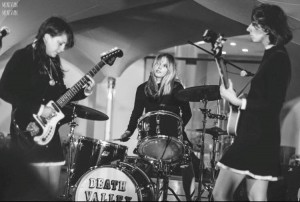
BB: You know those super fucked up stores you see and have no idea what they are and you’re like, “that must be a front for something.” He lived in one of those. There was a sign that said come and live on the farm for the summer, and make money harvesting crops and selling them at the farmstand. He made us wear the same hats, these weird bonnets, and he called us all “brother.” I was “brother Bonnie.” But I realized from that experience that there was something there. It was exciting. We would wake up in the morning and do our chores and stuff. We were all musicians and teenagers and we didn’t know how to do anything, so it was good having that structure, and actually learning about food, and appreciating those little accomplishments.
BS: Learning discipline.
BB: That word again! Yes. Total discipline. So yeah, there was definitely something there. And I’ve been getting into shamanistic ways to look at mental health, and how other cultures have looked at this.
BS: We (Americans) really aren’t dealing with it too well, professionally speaking.
BB: Not that I’m anti-medicine, I’m not. I actually think there are a lot of people in medicine who are starting to realize other ways to deal with it other than strapping someone down and telling them they’re crazy. I’ve had experiences where that’s happened to me. I don’t think when somebody is trying to attain some enlightenment or wisdom that you give them medication to just stop them from feeling. I mean, I tried to do it all as a kid. I tested on myself with LSD and all sorts of things because I wanted to achieve something that I probably wasn’t old enough or mature enough to fully understand. I was trying to force or induce a religious experience, and that’s not something you’re “supposed to do.” So the whole notion of “supposed to” became this overbearing force. I was discouraged from things like staying up all night because it’s not what you’re supposed to do. But we are the way that we are, and not everybody gets the chance to be the way that they are, and that’s the community ideal: to nurture people and allow them to grow, even if they’re not at a point where they’re completely self-sufficient, you know what I mean? I think that’s where I was at.
BS: What do you think would have been different if you weren’t intervened with such harsh methods?
BB: I don’t know what would have been different if my natural tendencies or curiosities hadn’t been subdued. It was just a horrible experience. It took me maybe ten years longer to become myself because I was so focused on suppressing things, rather than just doing what I wanted in the beginning, which was to blow my mind with ideas and create shit!
BS: Allowing your true nature to unfold—whatever that is—while protecting yourself from becoming someone else’s robot.
BB: Yeah, and parents aren’t perfect, and what is perfect? But it takes so long to undo what your parents have done or society has done, and that’s if you’re lucky. If you’re lucky you get to spend time learning about yourself.
BS: Deprogramming is a big part of the learning process. Assessing all the things you’ve adopted from others and seeing if it works for you.
BB: It did, it felt like I was a little robot walking around the world doing what it was supposed to, or getting in trouble for not doing it.
BS: I think a lot of our anxiety comes from what you’re talking about, that we feel we’re not given the chance to follow our own will.
BB: I was named after Faye Dunaway’s character in Bonnie & Clyde, and so my whole life was this idea of “true romance” and extreme fucking LOVE and going out in a blaze of bullets—
BS: Which you could! (both laugh).
BB: I could, I’m definitely not taking it off the table. But this idea of “true, intense love” being based just around a man and a woman, and I don’t believe that. I believe love is as many people as possible being as psyched as possible, and creating as much stuff as possible. True love.





Such a good read. Bonnie is so cool!